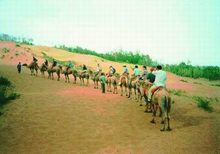
If you were to ask a Chinese person on the street, "What do you know about Tunisia?" you would almost certainly draw a blank. The majority of people in this country know next-to-nothing about this African country on the southern shores of the Mediterranean.
But Tunisia is about to get much closer to the Chinese, especially Chinese tourists who are fed up with the stereotype tour packages to "Singapore, Malaysia and Thailand," or are starting to feel a bit blase about trips to Europe, now that the Chinese and Tunisian governments have signed an agreement making Tunisia a tourist destination for Chinese travelers.
"Tunisia is the country where the gold of the desert and the green of the oases harmonize in a never-ending beauty, where the deep blue of the sky and the sea naturally blend, the place where, through 3,000 years of history, Phoenicians, Carthaginians and Romans have left their traces," says a tourist brochure published by Tunisian tourism authorities. It may sound a bit like your usual tour advertising. But there is truth in it.
For first timers, Tunis, the nation's capital, and the adjacent areas are the logical first choices.
The ruins in Carthage in the east of the capital take travelers back centuries to
the time when the great agricultural-commercial empire was in its zenith.
The dilapidated walls and time-worn remnants of house foundations, together with the green of the trees growing out of the broken corners of walls, give one a sense of time and change.
Looking into the ever flooding and ebbing Mediterranean afar, seeing the broken legacies of former times all around you, you are very likely to hear an unconscious philosophical sigh slipping unsolicitedly from your lips.
Bardo Museum, a few kilometers in the west of the capital, is a must and also the pride of the Tunisians. It is unique because it houses hundreds, or maybe thousands of mosaic pictures from Roman times.
Fine stones of various colors - black, yellow, brown and so on - are pieced together to make up all kinds of pictures, telling of the pastoral life of the local people at the time, and of their mythologies, legends and fancies.
No paint or artificial pigments are applied. The natural colors of the stone speak for themselves.
Ancient mosaic pictures are found elsewhere in the world. But in terms of numbers and concentration, Bardo Museum is unmatched in the world. It fully lives up to its reputation as the world's No 1 treasure trove of mosaic pictures.
The Great Mosque of Kairouan, the most important Muslim city in North Africa, located due south of the capital, was built in 1670, and its cultural and scholastic influences have reached into Europe and Asia.
Tunisia is more than history.
Sidi Bou Said, a little town overlooking the beautiful Mediterranean, beckons with its white walls, blue doors and windows, riotous colors of flowers against white-washed courtyard walls, and stone-paved alleys that wind into the inner recesses of the town.
When one gets tired of seeing so much beauty, one may sit sipping coffee at Cafe des Nattes, where literary and artistic giants like Andre Gide, Georges Bernanos and Paul Klee used to meet. Or one may have a few puffs from the Tunisian water pipe, a rather complex device, and have a taste of the local deep-fried dough cakes at a local tavern, while talking with one's friends in a very relaxed way.
Sousse is a seaside resort on the eastern Tunisian coast. Driving along the seaside boulevard, one sees stretches of fine-sand beaches on the one hand and lush resort hotels and villas on the other. The bay is bristling with masts of private yachts from European countries, France and Germany in particular. Their owners come here for fun and pleasure, as well as experiencing the thrill of venturing across the Mediterranean.
Restaurants there offer a local specialty - mutton stew. The chef puts mutton and various kinds of spices and condiments into a pottery jar, seals it with plaster and tin foil and then lets it stew on a slow fire. Once the seal is opened, the enticing fragrance permeates the whole restaurant. The first taste, even for a discriminating gourmet, is sure to elicit an utterly honest, "Yum, yum."
Each Tunisian city has its medina, or old town (Not Medina, the second holy city of Islam 338 kilometres north of Mecca).
Narrow streets and alleys lined with traditional confectioneries, silver ware shops, carpet stores, and dried fruit stalls intertwine with each other. Vendors hawk their goods loudly. It is often noisy and crowded, but vibrates with energy.
Tunisian oases are a wonder wrought by Mother Nature. Appearing like a mirage in the unending stretches of barren sand, the green of an oasis is a relief of the monotonous yellow of the desert. The luxuriant palm trees, the murmuring springs and other forms of energetic life contribute to the beauty.
Such oases include Nefta, Tozeur, Gafsa, Kebili and Gabes.
Besides oases, there are other places of interest - Sbeitla, Eljem, Monastir, Djerba-Zarzis.
And, of course, the Great South.
If one thinks of the Sahara, one conjures up pictures of amazing dunes, a vast sea of brownish sand, the muffled footsteps of camels. But the Sahara is much more than this - Berber villages clinging to steep mountain sides, castles hewn out of rock and cave dwellings reminiscent of those in Northwest China's Loess Plateau.
Further to the south, the horizon melts away into the expansive desert. The awesome vastness and the masculine beauty of the rough terrain simply makes one spellbound and speechless.
All in all, Tunisia is worth trying, taking into account that it is dramatically different from tourist destinations in Asia, which, up to now at least, have been the first choice of most Chinese.
(China Daily June 26, 2004)
|

